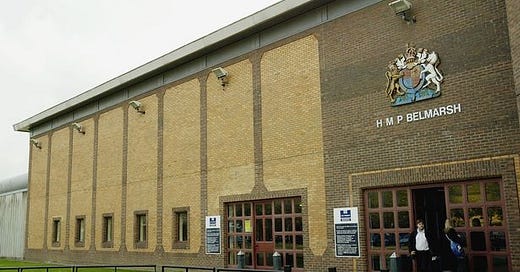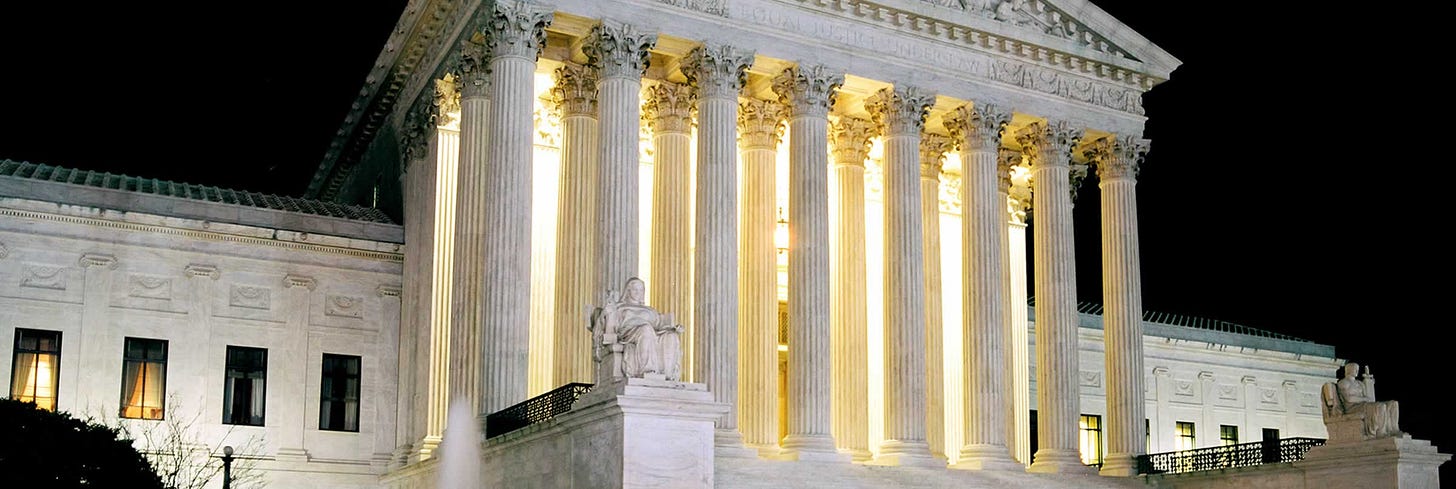A Coincidence of Two Decisions
Release of Julian Assange and Supreme Court Approval of Govt Censorship
This week saw two decisions on your right to learn the truth and say what you think. Julian Assange was released from His Majesty’s Prison Belmarsh after 12 years of confinement there and at the Ecuadorian Embassy in London. His transfer from the Ecuadorian Embassy to Belmarsh was effected by regime change in Ecuador and payment of a $4.2 billion bribe through the International Monetary Fund to the new Ecuadorian Government of President Lenin (sic!) Moreno. In April 2019, the same month the Mueller investigation ended without consequence, Moreno revoked Assange’s asylum. Assange’s crime, for which he was indicted in March 2018, and to which he was forced to plead guilty as a condition of release, was Conspiracy to Commit Computer Intrusion (18 USC 371). This week he was retroactively sentenced to ‘time served’ and released from Belmarsh Prison. This could have been done at any time during the past 12 years, but not for a political prisoner. His real crime was embarrassing U.S. Government officials.
Most embarrassed was Hillary Clinton, whose ill-concealed private statements conflicted directly with her public statements as Secretary of State. Caught in repeated lies by Wikileaks releases of her own messages, she once plaintively asked in an Obama Administration Cabinet meeting, ‘Couldn’t he [Assange] be droned or something?’ In other words, she was asking for a precision air strike on a personal enemy in the center of London. She was not alone in wishing Assange dead. Several members of the U.S. spy agencies had stated they would assassinate him if he ever set foot in the United States; wisely he resisted all extradition attempts, preferring survival to possible acquittal. The messages that Wikileaks published were from official State Department records detailing, among other things, grossly insufficient protection of a U.S. Ambassador and other staff assassinated in Benghazi Libya. These messages had to be concealed, according to the spy agencies’ thinking, because they revealed that Benghazi was a transit point for weapons shipments to Afghanistan — missiles and rockets that fell into the hands of the Taliban, who intercepted them in Qatar. Serial numbers on the shell casings proved that these same weapons were used by the Taliban to shoot down U.S. Army helicopters. Very embarrasing indeed.
Also among the messages Wikileaks published were those from the Democrat National Committee (DNC) in 2016 to create the appearance of collusion between the Russian Government and presidential campaign opponent Donald Trump, to interfere in the election that year. Though the crime of treason has a quaint flavor, that was essentially the accusation, which was repeated endlessly without proof throughout his term as President and beyond. The accusation was the brilliant brainchild of DNC campaign manager Ed Podesta, to divert and redirect attention from then-Secretary Clinton’s own decision to favor Russia with possession of 20 percent of the North American uranium resource, in return for a substantial contribution to the Clinton Foundation. Podesta’s email messages were also published by Wikileaks. Terms for fabrication of the soon-to-be-famous dossier by unemployed British spy Christopher Steele, published by Wikileaks, disclosed use of the Perkins Coie law firm as cutout to launder payments for third-hand hearsay alleging Trump-Russia collusion. The DNC classified these payments as legal expenses.
Julian Assange, in deference to the wishes of Seth Rich’s family, has never disclosed Wikileaks’ source. Seth Rich was the DNC operative who was murdered in Washington DC in June 2016. The murder was never investigated by the DC Police or the FBI. The FBI still has Rich’s computer in its possession, probably in the same place it keeps Hunter Biden’s computer. The speed of transfer of the DNC correspondence (44,053 DNC emails and 17,761 DNC attachments) to Wikileaks, according to independent forensic investigators, was much faster than could have been done by electronic hacking. Thus, unless a Russian mole burrowed into the DNC (which no one has ever suggested), the data must have been taken into a USB memory device by a DNC employee. Seth Rich was known to be upset with the DNC’s grossly undemocratic exclusion of Bernie Sanders, his preferred nominee. But Rich wanted money. He undoubtedly provided the incriminating information about DNC activities to Wikileaks, but never got a chance to collect the reward he sought. Further research, as they say in academia, is needed on this matter. Now that Julian Assange is free, and after he has had a chance to recuperate from his imprisonment, perhaps those who know the circumstances will fill in the missing links.
Julian Assange returns to a different world from that of 2012. His native Australia is now in some ways a prison itself, having rounded up into concentration camps some of those who refused experimental gene-modification covid injections. All of the Five-Eyes nations — Australia, New Zealand, Canada, Britain, United States — joined as one entity by their spy agencies, have transformed themselves ‘in the twinkling of an eye’ into lockdown and locked-up dictatorships, with WEF-groomed officials in charge of the first four. Everyone who benefits from free speech, which is to say everyone who wishes to learn the truth, owes a tremendous debt of gratitude to Julian Assange.
The other free speech decision of note this week is the U.S. Supreme Court’s 6-to-3 vote refusing the preliminary injunction against U.S. Government censorship sought by the State of Missouri in Murthy v Missouri. The Supreme Court clearly doesn’t like States ‘interfering’ in Federal matters, even where administrative agencies have clearly exceeded the authority granted to them by Congress. ‘Congress’, the U.S. Constitution says, ‘shall make no law abrdiging freedom of speech’. Therefore administrative agencies have no censorship authority, because Congress is not permitted to grant them such authority. Therefore also any censorship by administrative agencies is illegal, unconstitutional, and of no force or effect. Had Missouri’s request for a preliminary injunction been approved by the Supreme Court, that would have been the result.
Suppressing free speech unquestionably harms everyone, not merely those who were cancelled, censored, de-platformed, banned, and algorithmically down-regulated by social-media behemoths acting under instructions of Federal agencies. The nature of the harm is not specific to any individual, but to the entire nation and to the society which absolutely must have free expression to learn what is happening in real time and act accordingly. Free speech is also essential for society to advance its underestanding and move beyond the disputes that otherwise paralyze it. Yet the Supreme Court opted to rule that Missouri had no ‘standing’ to bring this case, as if the harm done by censorship must apply to specific individuals, otherwise it doesn’t matter. Just as in Texas v Pennsylvania where the Court ruled one State has no standing to complain about another State’s violation of election law, the six-Justice majority here posits a nation of atomized individuals blind to the damage of administrative overreach to the entire society. In effect, they ask everyone to be blissfully unconcerned with and even unaware of harm to anyone other than himself (or theirself as the language police might have it).
Standing is one of those nebulous doctrines that judges use when they shrink from the consequences of judgment. Doctrines like standing, justiciability and ripeness come in handy when judges wish not to decide something and instead use procedural grounds to reject inconvenient demands. Justiciability means a case is not really a legal matter, settle in some other way. Ripeness means the case is not ready for judicial consideration, and is often used to reject claims of election fraud while an election is in progress. After a fraudulent election, of course, the case is moot, meaning, too late. With its Murthy v Missouri decision, the six-Justice majority as much as says ‘Harm? What harm? What do you care if someone else was deprived of free speech by Government decree?’
Alex Berenson, the lead plaintiff in Berenson v Biden, finds some hope in the standing argument proffered by Justice Barrett, who wrote the Murthy decision. Berenson is a former New York Times science writer who has written extensively on the sickening consequences of experimental gene-modification injections from Pfizer and Moderna. He has been a thorn in the side of the Biden Administration, which had been (and still is) vociferously promoting these injections purportedly directed against covid. Pfizer Board Member and FDA Commissioner Scott Gottleib, a walking conflict-of-interest, got White House official Andy Slavitt to lean on Twitter to ban Alex Berenson by name. If that isn’t a case of specific harm to an individual, I don’t know what is. While Berenson would be the first to say that banning him is an offense to everyone for whom he writes, the legal point is that Berenson v Biden clearly satisfies the standing requirement that the Barrett majority cited. Perhaps the Supreme Court, mindful of the political significance of both cases, favored administrative overreach and censorship in one case, while reserving its eventual backing of Constitutional free speech in another case? We shall see.






